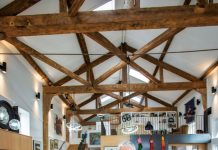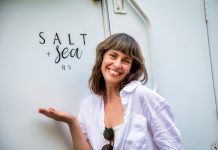LORRAINE’S LEGACY
Most of us have heard or caught a glimpse of it while making the ferry crossing to Prince Edward Island. There are the lucky folks that have made a day trip or rented a cottage for a week or two. There is a special lot who have the good fortune to summer on the idyllic little sand spit and then there is the handful of born-and-bred islanders who cannot conjure the idea of living anywhere other than Pictou Island. It’s not the place that you would imagine a 90-year-old, visually impaired widow to be spending her golden years but that is exactly where you will find Lorraine MacMillan, and she will tell you that she intends to be there until she takes her last breath of salt-spun air.
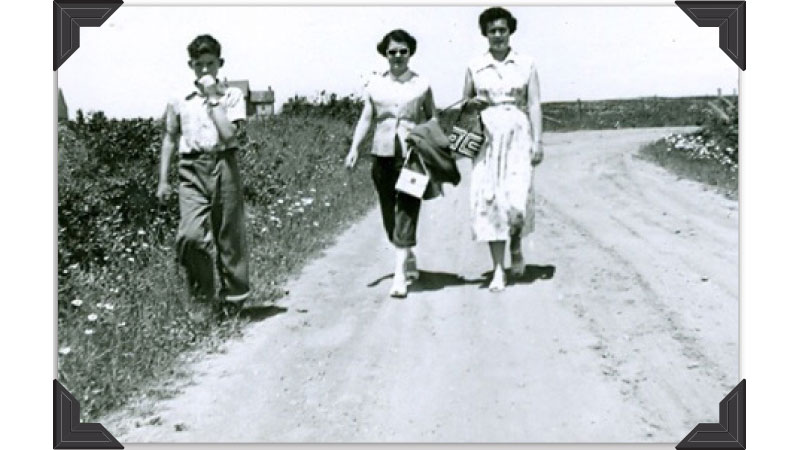
For 90 years, the little hiccup of land just four miles off the mainland has been home to Lorraine. Brought into the world with the help of the island midwife in her parent’s home on the west end of the island on January 19, 1927, she’s never strayed far for long. Little visits to the mainland were nice but she always believed that getting back on the island was twice as nice.
And like the tides of the Northumberland Strait that continue to define the shoreline of the tiny nine-mile-long island, Lorraine has seen the rise and fall of a community that at its peak was home to more than 200 people who created a microcosm of economy in their little fishing village. The people worked together, worshipped together, celebrated together and at times mourned together. To say that it was a simple life would not be entirely true. In Lorraine’s words, to be an islander, you had to be ‘rugged’ but she believes that there was honesty in knowing that almost everything you needed you created on your own and when called on, shared with your neighbours. There would be months where the island would be silenced by winter and the only connection to the mainland was an arduous trip over the solid sea by iceboat.
But time has a way of changing things, even on an island where the ocean could only slow down the profound mix of modernity that was happening on the mainland. Changes to education delivery, the fishery and opportunities that opened up with the growth of new industry in Pictou County all took its toll on the island population. With each passing year more island families made the decision to make a permanent “move to town” or winter and fish from the mainland and keep their island properties for the gentler months.
Today only nine people live year-round on the island; however, the winters are not a sentence to solitude as they once were. The island mail plane that flies out of the Trenton airport now brings provisions when needed and every now and then a few passengers checking in on their island homes and visiting the hardy winter stock like Lorraine and her son Bill, who is now the only fisherman with a lobster license from Pictou Island.
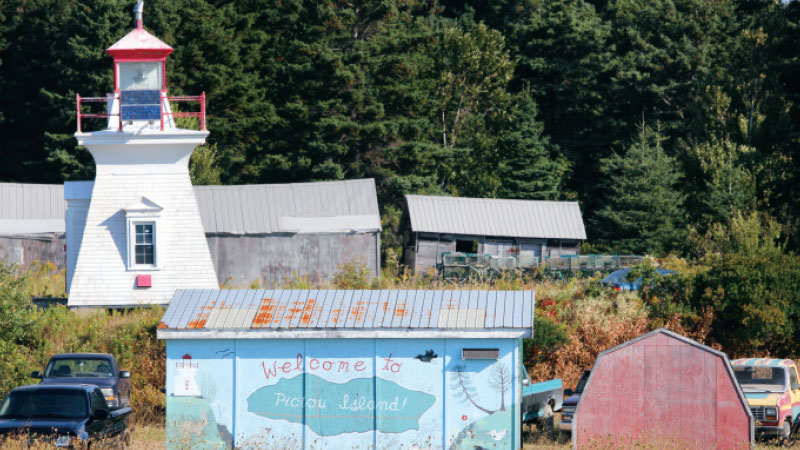
Lorraine occupies her winters as happily today as she did as a girl when she spent nights with friends and family knitting, rug hooking and playing cards. She remembers waiting with great anticipation for the Eaton’s catalogue and she would flip through the pages until they were all but worn out as she decided on a new dress to order for Easter.
Lorraine has never felt lonely on the island. When she lost her eyesight decades ago she made the best of what she had. Special playing cards made by a friend on the island, that she can read by touch, make her the undeniable champion of the weekly Auction 45 card party that she hosts for her island friends and as a few of her family will attest, she loves a good chat on the phone.
There is a new and eclectic mix of people influencing the island population and its future, and Lorraine MacMillan knows them all. She is the matriarch of an island that is starting to experience a subtle shift in its identity. With the exception of a few seasonal fishing boats and the all but abandoned trap houses that huddle on the shore, the traces of the stalwart fishing community have almost all disappeared. The fields once farmed by the fishermen and their families long grown over are now being cleared
to build summer homes by people who “come from away” and old lobster traps are now painted in lively colours and decorate decks and gardens. Rental cottages, a bed and breakfast and wooden tents now attract a growing number of curious tourists.
Now that summer is here the door to Lorraine’s front porch swings open more often with visits from family and friends. There is a little more traffic on the main road that runs the length of the island and she is hopeful that more people will start to discover what she has known all of her life.
LAW OF NATURE
Sarah MacDonald is still hanging on to her winter tan. She has returned home to Nova Scotia after six weeks in the Caribbean and is on her way to the Trenton Airport to hop on a plane with her partner Ed George. They have a quick trip to Pictou Island to take one last look at her property at John Dan’s Cove before the construction of her little cottage gets under way. She wants to make sure that the cottage is stationed just so, capturing her favourite view and connecting her to the memories of two of her greatest joys in life.
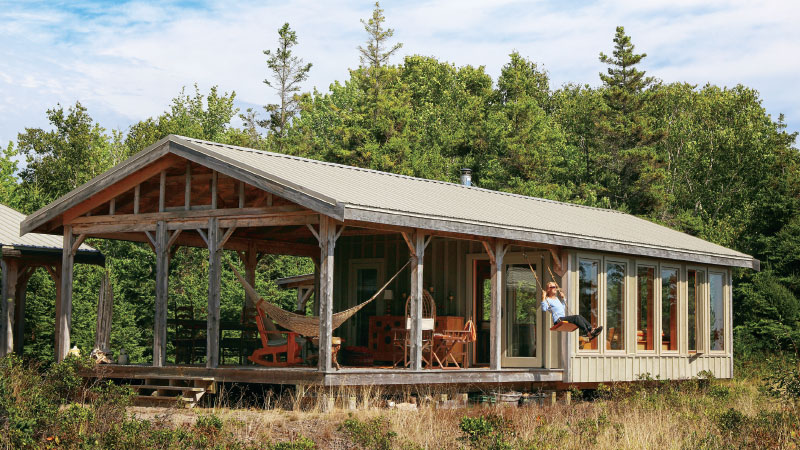 In the 11 years since Sarah set foot on Pictou Island she has endured the loss of both her son Josh who died at the age of 11 from Cystic Fibrosis and her best friend Julia Law who passed away last fall after a valiant battle with cancer. Late last summer At Home met with Sarah and Julia to talk about their vision for aremarkable Eco-Retreat. At the time Julia was in the final stages of her disease but she wanted to share her story, show what she had created and reinforce her love for an island that had become her home. Julia’s Eco-Retreat had become something that makes all islanders proud. This is Sarah’s story of Julia’s legacy as told to At Home on the North Shore.
In the 11 years since Sarah set foot on Pictou Island she has endured the loss of both her son Josh who died at the age of 11 from Cystic Fibrosis and her best friend Julia Law who passed away last fall after a valiant battle with cancer. Late last summer At Home met with Sarah and Julia to talk about their vision for aremarkable Eco-Retreat. At the time Julia was in the final stages of her disease but she wanted to share her story, show what she had created and reinforce her love for an island that had become her home. Julia’s Eco-Retreat had become something that makes all islanders proud. This is Sarah’s story of Julia’s legacy as told to At Home on the North Shore.
When Julia hopped on to the Pictou Island Wharf carrying a flat of Perrier and wearing a pair of Gucci glasses there were likely a lot of islanders thinking, “well this isn’t going to work!” but she quickly showed everyone the stuff that she was made of and she wasn’t afraid of getting her hands dirty. I think Julia surprised people wherever she went. She had an incredible life as an executive with companies like Coca-Cola and Nike. She travelled the world. I remember the first time I met her. It was in 2006. We met though a mutual friend at an environmental event at the Wooden Monkey Restaurant in Halifax. We hit it off right away. There was something about her that was so familiar and we eventually figured out that my Grandmother and Julia’s mother were cousins. It was one of those meetings where you think back and say things happen for a reason. My husband at the time and I had just purchased property on Pictou Island, Julia was intrigued and asked if I wanted to go into partnership with her to create something unique on the island.
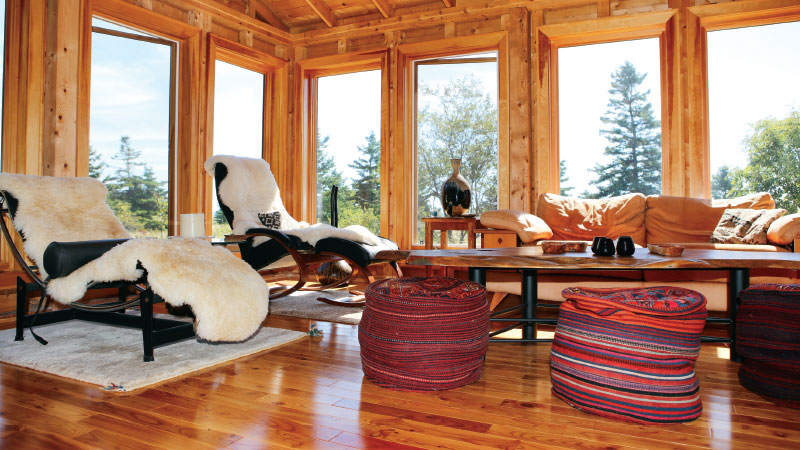
The original plots of land on the island ran from north to south so you have water on both sides. Julia had designs of making a camping to glamping experience. She thought we could do something where you could hold fundraisers and maybe even do a Cystic Fibrosis camp.
My son Josh had Cystic Fibrosis. Julia and Josh became very close in the few years thatthey knew each other. My involvement with the partnership started to get complicated when Josh’s health began to deteriorate and my husband and I divorced. Julia continued on with a development on her part of the property and in a few years had created an amazing personal retreat. She travelled a lot when she was working on the plans for the retreat. Shortly after starting the project she went to Africa and went luxury tenting. I think part of this experience and the experience of all of her worldly travels influenced the design of her project that has become known as the “Pavillion.”
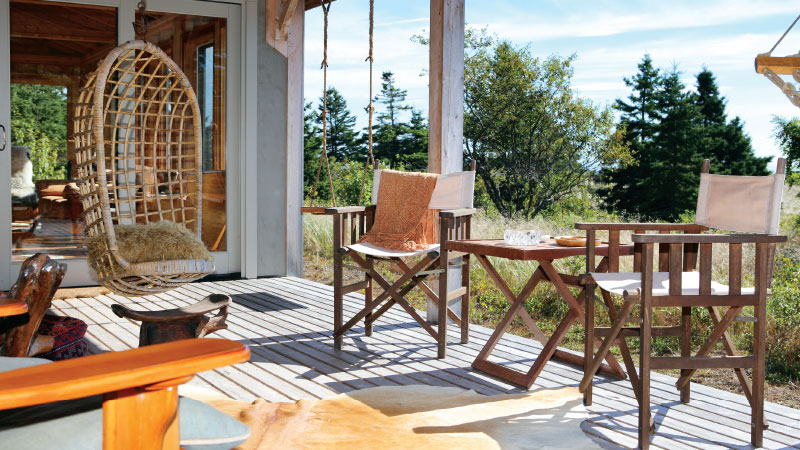
She worked closely with island builder John Ross. They hadbecome close friends while she was living in a farm house on the island. Her family was also spending holiday time on theisland and the property near the beach would give her her own space. She started the project with two yurts. John Ross built the platforms and she ordered the yurts from a company in the Annapolis Valley. The main pavilion came later. It is really one big living space with a lounge area and kitchen inside. She had such an eye for design. She had great style and she collected furniture and art from her travels. I think my favourite pieces are the live-edge coffee table and the kangaroo leather couch that she brought back from Australia.
Julia was doing some consulting work in 2013 when she was diagnosed with Mesothelioma and she started to travel for cancer treatments but with the help of John Ross, the Pavillion was completed but she never did get to spend the time there that she had hoped for… that we had hoped for. She hosted a couple of corporate events but her idea for the retreat was never realized.
I think Julia will always be remembered for being inquisitive, strong, funny, witty, smart, open and honest. Everyone that met her loved her and she had a way of making everyone feel comfortable. The Pavillion was left to her family and I am returning to my own plans for a new life on the island. I am going to be working with the Pictou Island Ferry and Charter Service and I am going to be moving ahead with my own cottage. I am not quite sure what direction everything will go now. A lot of things have changed but one priority is to re-name the lane to my little cottage. I want to call it Josh and Julia’s Way.
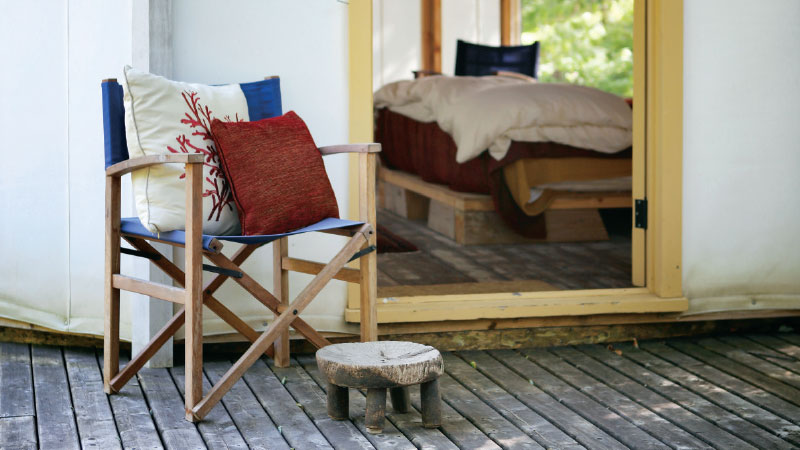
BUNNIES AND A BUILDER
When Linda Schweitzer and Peter Lauch were putting the finishing touches on their “shunkee” (a hybrid of a bunk house and a shed) they had to go on an unscheduled scavenger hunt to find an elbow joint to complete the installation of a cook stove that would make or break their late autumn visit to their property on Pictou Island.
It was a defining moment in their on-going initiation to island living. If you don’t have what you need when you live a few miles from the main land you wait or you improvise or in this case, cross your fingers and go on the hunt for what you need.
Knocking on at least 12 doors didn’t reveal the sought after elusive piece but it did yield an idea for one more place to try, the community hall where an old stove had been disassembled. Bingo, they found it.

Maybe not shiny and new like the other components of their new stove but once they cleaned out a few abandoned nests festooned by mice and birds they were able rig up their heating source and get on with the remainder of their to-do list.
For Linda, a professor in the business school at Carlton University in Ottawa and Peter an Engineer currently working on the light transport system in the nations capital, the search for the elbow joint taught them something else about island living—your business quickly becomes everyone else’s business but you have a community that is knit as tightly as a fisherman’s old woolen sweater.
The Schweitzers purchased their Pictou Island property in 2013. They had spent a dozen summers vacationing in Black Point, Pictou County and little jaunts to PEI and Cape Breton when their children Katrina and Max were young teenagers. They often relaxed on the beach at Black Point and wondered about the little island within eye sight.
“The locals never did a good job selling the island,” says Linda with a chuckle. “We were told that it was hard to get here and once you did get there it was really hard to get around.”
Then one summer Linda and Peter had a hiccup in their east coast vacation plans. The cottage they had rented in Black Point for many years was no longer available but they had a new lead on a rental on that mysterious island.
It was other-worldly, muses Linda on her first visit to Pictou Island. “When we pulled up to the wharf the sun was setting, there were bunnies hopping around, it was just beautiful, we were hooked instantly.”
After renting for a few more summers Linda and Peter were convinced that Pictou Island is where they wanted to be on a more permanent basis. They purchased a piece of land from
Ron and Jane MacDonald and started to pull together a plan. With busy careers and kids entering university their dream to build their summer house would have to take shape slowly but their primer on island construction had begun.
“The well and the shed to hold our gear were the first steps,” remembers Linda. “Peter’s idea was to build something that was long enough to store a 14-foot kayak and our ATV but something that we could also camp in. Everything moved very slowly at this point of the project. We did most of the work ourselves.
We were an unskilled labour pool but we loved our little space. We were pretty cozy there, we eventually built a little bathhouse with a composting toilet and a shower heated by solar.”
Linda and Peter continued to spend a few weeks in their “shunkee” in the summer with their kids and they had a few visits in the spring and the fall. Then one day the local trusted builder, John Ross, stopped in for a visit.
He said, “Here’s the thing. I am 66 years old and if you want me to build this house I need to build it now and not in five years,” remembers Linda.
In 2015, two years after purchasing their beach property, Linda and Peter were putting sonotubes in the ground to provide the foundation for their dream house.

“This was the biggest build that John Ross had done on the island,” says Linda. “And everything is so much more labour intensive. You have to be really organized, there are more steps to take and everything costs more. You have to have your building materials loaded on the boat in Caribou and then unloaded on the island side and transported to the property. If you are missing something you can’t just go to the hardware store to pick it up, you have to wait for the next boat.”
Despite the challenges of transportation and weather the cottage build moved along at a steady pace. John Ross engaged a young builder from Tatamagouche who brought a boat load of his own crew. John housed and fed the crew during their weeks on the island.
“When we left for Ottawa that fall there was a floor, when I came back to check on things I was walking on the second storey of the house and the roof was on. I was literally speechless by how much they had accomplished. We worked really hard for the next week to get everything battened down for the winter.
Linda said there was no way they could have accomplished so much without having John Ross as their project manager. “Just having him there and his connection to everyone on the island just made everything so much easier.”
Last year Linda took a sabbatical leave from her teaching position at the University and was able to spend more time on the island and became involved in the finer details of the build. She and her husband Peter are still a few years from retirement and their plan for living a good part of the year on Pictou Island but they know they made the right decision.
“There is a funny thing that happens when you get on this island—the worst thing is knowing that you have to leave. Once you do leave, even if it’s only for a day, you just want to get back.”
TWO IN SOLITUDE
The words reclusive and anti-social might come to mind when you think of someone who chooses to live year-round on an isolated little island, but Corinne MacDonald and her husband Ray Docker dispel that myth very quickly. Every nook and cranny of their century-and-then-some old farmhouse near the east end of the island shouts welcome.
Large decks off the back of the house facing the ocean have space for dining in the summer sun, a pergoda under garlands of grape vines create some corner shade and a place for a sip of wine and conversation at the end of the day. Gardens between the house and the beach create another space to linger and pull a few weeds and cheerful adirondacks say, “take a seat and enjoy the view.”
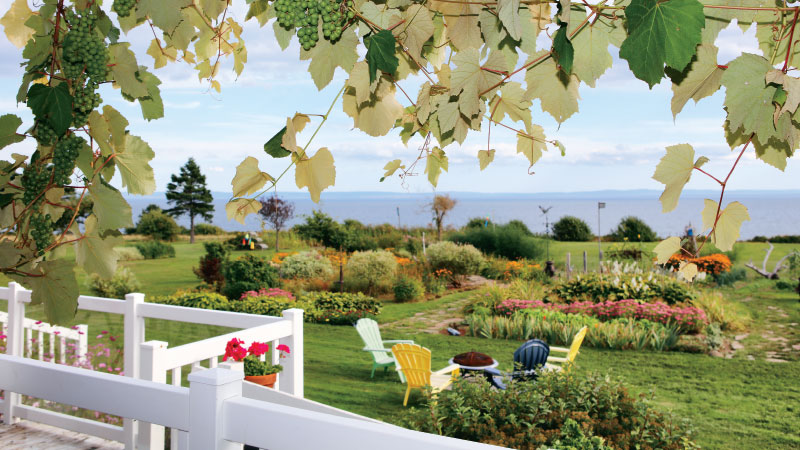
It’s a big house for two people but each renovation over the years made room to accommodate more guests and each iteration has made way for a few more conveniences and technologies, setting them up with many more comforts than the original residents could have ever imagined.
All summer long Corinne and Ray keep to the rhythm of entertaining family and friends but when the winds start to shift, the ferry stops running and the moon rises in the night sky before supper is on the table, that is the time that the couple really count their blessings. “We enjoy our quiet time and the serenity that island living in the winter provides,” says Corinne. “We love our time alone together and each other’s company.”
With the exception of the last few years, Corinne and Ray have lived year-round on the island since 2002. They were both educators working in local schools and then abroad for a few years before returning to Pictou County in 1992. Ray said that they knew they wanted to retire to Pictou Island where he had owned the farmhouse since the mid-sixties. Ray had originally purchased the property with his first wife Pat. They had spent every summer on the island with their two boys until Pat passed away in 1987. “It was our cherished summer home for 20 years,” says Ray. “When I met Corinne and introduced her to the island it turned out that she was as attracted to the island as I was.”
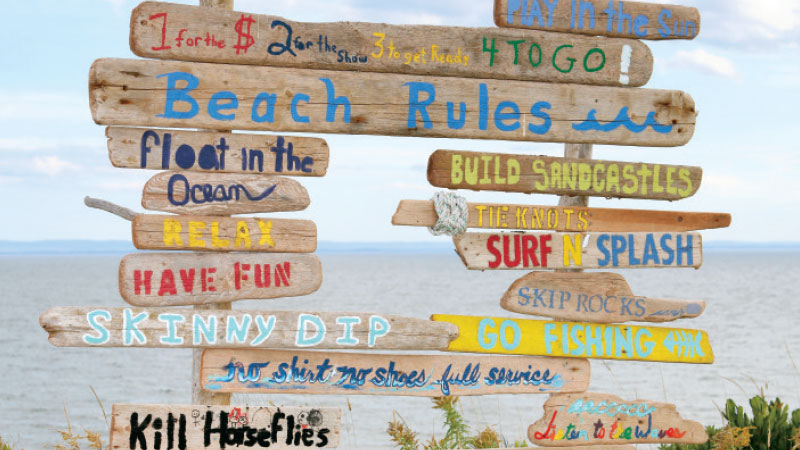
Before making the decision to move to the island full-time the couple spent two winters roughing it. “We pumped water from the well, used the outdoor toilet and kerosene lamps. We enjoyed the warmth of the wood stove with wood supplied by a generous neighbour. We were blissfully happy and we made the decision that when we could, we would move to
the island full-time.”
Switching gears from a summer retreat to a “retirement” home called for some significant renovations and improvements to the heating and energy sources. A barn, new windows, roof, indoor plumbing, solar power, a small addition and a huge deck over the course of a few years eventually brought the house up to a standard where Ray says they enjoy all of the comforts of a modern home.
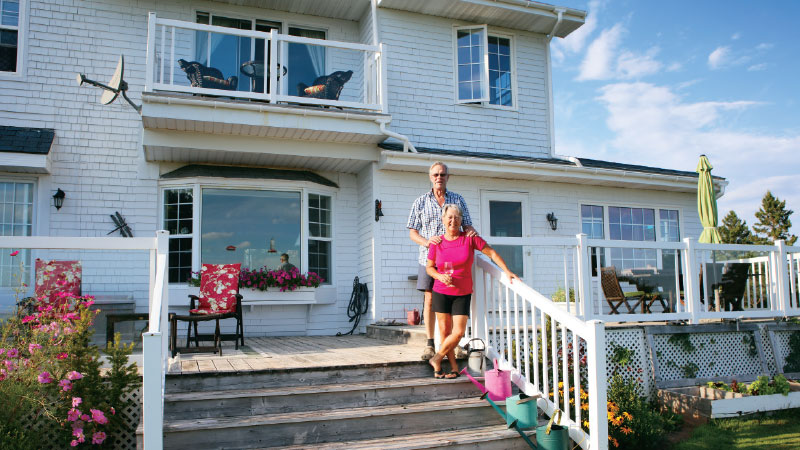
While solitude is abundant in the winter so are their activities that keep them busy. When the real cold sets in they take turns getting up early to put some wood in the stove to warm up the kitchen. Rarely would a heavy snow fall interfere with their day as they have no place to go. A narrow path shoveled to the barn for wood and bird seed is all they need and the snow shoes and cross country skies are always near by. “Most days we try to get out for a walk, cross-country ski or snow shoe. We are always cooking something and once a week island residents get together for an evening card game of 45s,” says Corinne, who also completes two or three rug hooking projects throughout the winter.
The quiet has never crept into feelings of isolation. With few exceptions the mail plane makes its regular run and wifi has made it easier than ever to stay connected to the rest of the world. “To winter here, one needs to be organized to ensure that there is enough wood for heat and food,” adds Corinne, “but I can’t think of anything other than maybe live theatre that we really miss. We truly have everything that we want or need.”
AN ISLAND AFFAIR
Jane and Ron MacDonald’s island home nestles in on the top of a bluff and looks out over a swath of white sand that stretches along the south shore. Behind them close to 100 acres connects them to the north side of the island and John Dan’s Cove. They will be headed there a little later in the day for a picnic and to catch the remainder of the summer sun.
But for now there is still a little work to do. It fits into their philosophy on island living where Jane says that they work hard and play hard. There is always something that needs some fixing, gardens to tend to, food to be prepared or a neighbour that needs a little help. They have created a rhythm to their days and to their 33 years of marriage, most of which have been spent on Pictou Island.
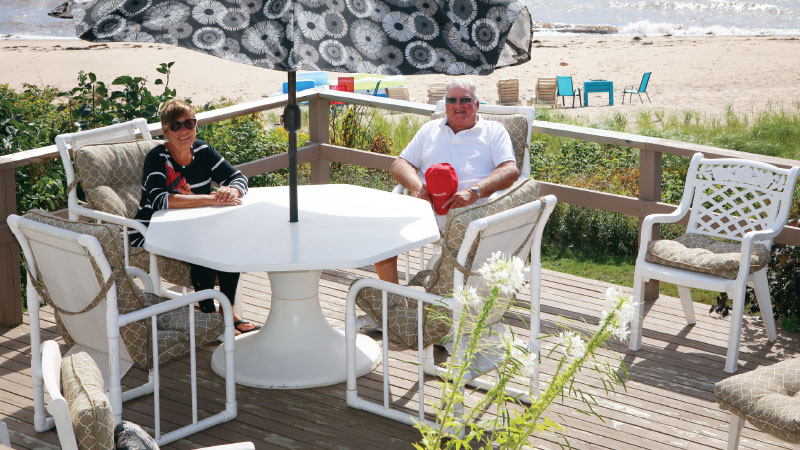
Ron is an islander by birth. His father tended to the lighthouse on the west end and his mother was the island nurse who brought more than 300 babies into the world and helped ease almost as many an old islander on their way out. His upbringing is the stuff of legend and folklore with a story line that is coloured with characters and circumstances that he brings back to life on the pages of his private journals.
There have been few days in the 30 years since Ron started to keep his journal that he has not turned to a fresh page to record his observations and recollections.
“He has an incredible memory,” says Jane. “He has a story about everyone that lived under a roof on the island.” When we were courting he would take me for drives up and down the main road of the island and tell me stories about every house that we passed by and then he would expect me to remember,” says Jane with a happy laugh but who has also accrued her own knowledge and love for the island. While Ron has lots of requests to share his writing publicly he intends to keep them private for now with the exception of a close friend who has been transcribing hundreds of handwritten pages into a digital file.
“The island is a different experience for Jane than it has been for me. Pictou Island was all I ever knew as a young fella,” says Ron. “I came to the mainland in 1953 and it was over 30 years before I went back to live full-time. Life was a lot easier from what it used to be when I returned with Jane.”
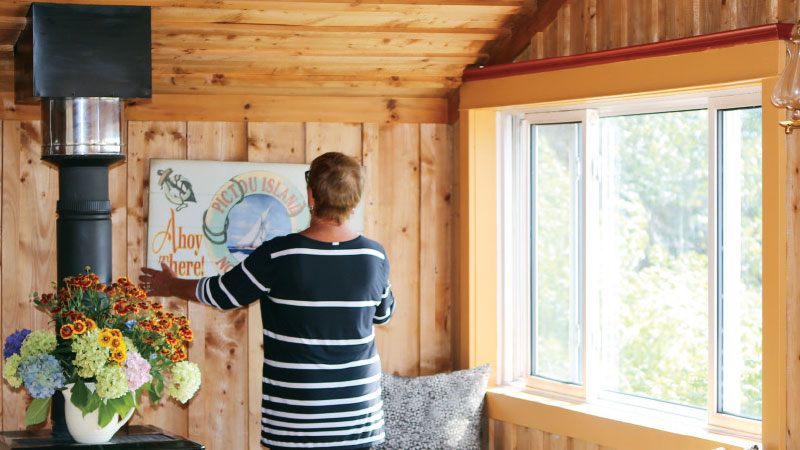
It’s hard to tell who or what romanced Jane first, Ron or the island. Her love affair with both is tightly entwined. When they met, Jane was teaching and Ron was running Harbour Light Campground in Braeshore, lobster fishing and had his hand in a few other ventures. He had six children from two previous marriages. Cancer had taken both wives. Jane says she remembers a few raised eyebrows when she started dating Ron but it wasn’t long before people realized they were a perfect match. Pictou Island was at the heart of their relationship. From their courtship, to their honeymoon, to the home they would build in 1989 Ron and Jane set their course for island life.
A year after building what was intended to be a cottage the couple decided to move to the island permanently. After a brief and fortunately resolved health care crisis of her own Jane knew that she wanted to experience year-round island life and for 25 years that’s exactly what they did.
“Something magical would happen when I was on the island. I just knew that’s where I wanted to be. Living on the island has been fulfilling a dream,” says Jane. “I was always intrigued by the island. As a girl I would go over on speedboats with family and friends. We would fish for mackerel and pick blueberries. I never dreamt that I would someday live here.”
Being part of the tight-knit community has been the most meaningful part of their island experience. The winters never feel long or lonely with evenings filled with dinner clubs and games nights, the warm glow of lanterns and the cozy heat emanating from the wood stove fuels conversation long into the night. But over the years Jane and Ron’s circle of friends living full-time on the island is getting smaller. The island population is a shadow of what it was when Ron left as a young man and almost every year since their return in the early 90s another family would make the decision to move to the mainland. Two years ago Jane and Ron made their own difficult decision to return to the mainland during the winter months.
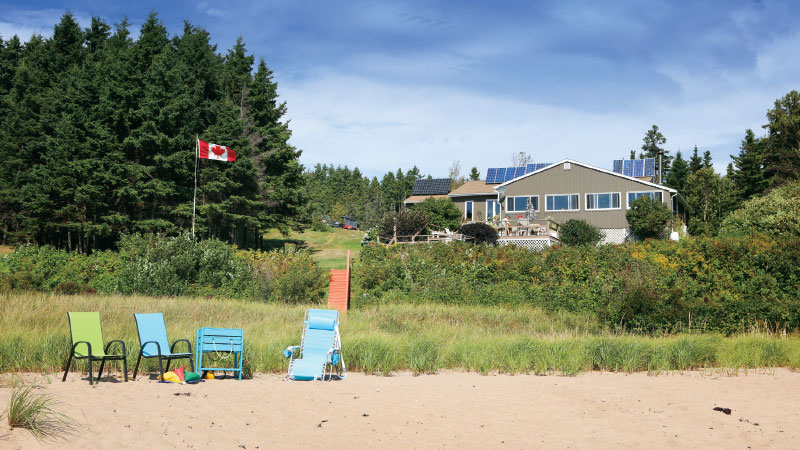
Today there are only four year-round households on the island. “It’s not a lot for a community to survive but there seems to be a bit of a rejuvenation,” says Jane referring to a small influx of newcomers to the island in the last few years. Jane believes that technology paired with a desire to live less encumbered lives has created a new allure for places like Pictou Island. “You can pretty much work from anywhere these days and that is something that we should be promoting if we want to see our little community survive. We have an eclectic group of people on the island that makes life here very interesting. There are Ph.D.s, engineers, tech people, teachers, entrepreneurs, pensioners, throw in the local characters and you have a very interesting slice of life. We just need more of these people staying on the island year-round.”
The transition of real estate on the island has been slow. All of the properties are privately held and have been in families for several generations. There are several absentee land holders who picked up properties from bank sales in the 1960s when the island economy was in swift decline; however, there are owners like the MacDonalds who have sold a few parcels of land to “new blood” who they believe will have the same appreciation for the island beauty and its potential.
Living on the mainland for a few months each winter has not softened the MacDonald’s resolve to be islanders for as long as it is earthly possible. For Ron his connection to the island is following a pragmatic natural course balanced by Jane’s continuous sense of wonder. “Something magical happens when I step on this island,” adds Jane with a hint of emotion. “It’s just the place that I want to be. The first thing I do when I return each time is walk our beach. Until I take my last breath this is where I want to be.”
A BOY, A GIRL, A TENT, AND A TREAT
In 1998 Lorne Matheson left Toronto to look for some land on the east coast. He poked around a few properties on the south shore and Cape Breton but on his way back to the city he made a stop to the old family homestead on Pictou Island. He realized that of all of the places he went to see that summer, Pictou Island was hands down the perfect place to be.
As a boy Lorne had spent most of his summer vacation on the island, playing in the woods and on the beaches in the quiet solitude of a young man’s imagination. His mother had been born there and he still had a handful of family either living on the island or close by on the mainland. The following year he purchased a piece of the family property and started to refurbish a tired and deserted trap house into his summer cottage that looks out over the wharf on the west end.
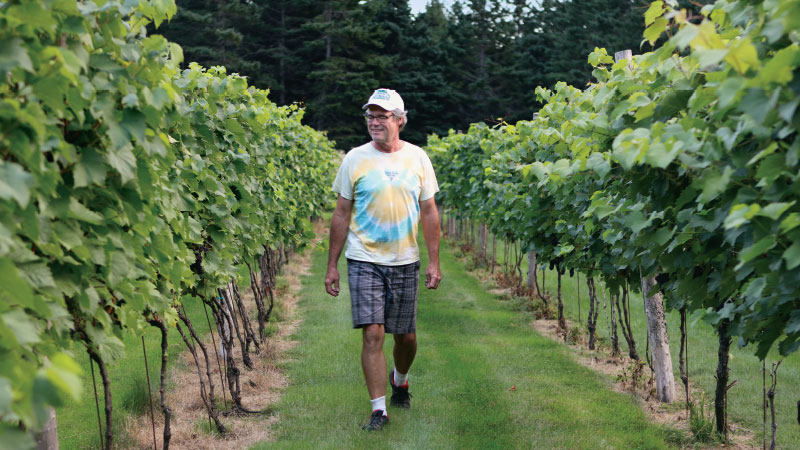
From the beginning Lorne had a bigger plan for his property than just a retreat from the mainland. His return to the island unearthed a stronger connection than he might have first realized. He felt that he had come full circle and while he says that spending more quiet time on the island has not changed him, he has become reacquainted with his love for the outdoors and his enjoyment of tranquillity. “I can go two or three days without talking to anyone and it doesn’t bother me,” says Lorne with a boyish grin that likely hasn’t changed much over the years.
His love for solitude has not hampered his hope that Pictou Island will some day become more of a destination and strengthen the wilting economy of another small rural community once dependent on its fishing resources. Even since his return in the late 90s he has seen the lobster boats disappear from the wharf. This spring there is only one lobster license on the island. He has also watched the out-migration of the winter residents who had numbered 35 on his arrival almost twenty years ago down to nine this past winter.
His fear, like those of his neighbours, is the maintenance of services like the ferry, mail and roads, to a landscape that could be all but deserted in a few more years if more people don’t chose to spend at least part of their winter on the island. But what seemed like a sad tale of another Atlantic-Canadian community in hospice has been a spark of renewal for the historic little island. In the last few years there has been a new mix of people “from away” with a younger generation of people with ties to the community who have returned to create a sort of revival.
Lorne and his partner Wendy Foley had their own ideas to bring a little lift back to the local economy. In 2016 they opened the Wooden Tent Company on Lorne’s property. Their original idea was to open a campground; however, knowing the challenges of hauling gear onto the ferry they turned their business plan toward a less encumbered experience for their future guests. Their company provides just about everything a camper would need with the exception of bedding and food. This year the Tent Company will also have cruiser bikes for rent so guests can explore the island from east to west and north to south.
The campground concept had been a dream of Wendy’s since she purchased her island property 10 years ago. Like most people who find themselves drawn to the island she had her own family history. Her grandfather had once operated a ferry service with his fishing boat. Her mother would spend the afternoons on the beach while her father would ferry people back and forth to the mainland. As a teenager Wendy’s own love affair with the island began. Lots of weekend trips with friends and staying with various families on the island solidified Wendy’s desire to own her own place someday. The summer she was turning 40 she declared that she was going to the island and she wasn’t coming back until she owned something.
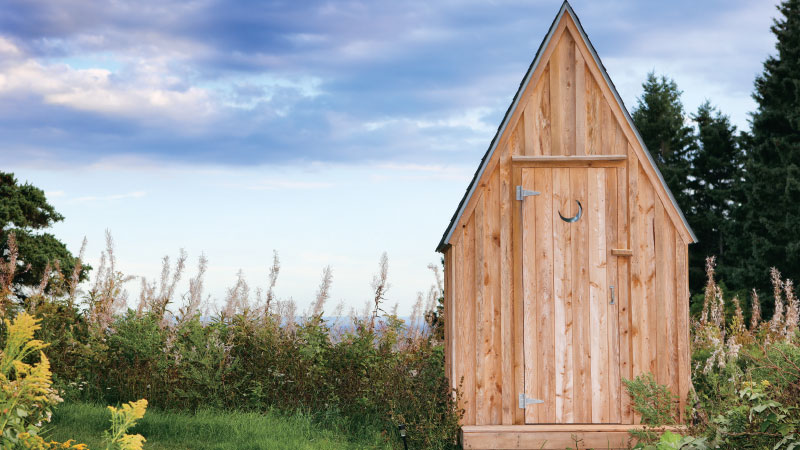
“From the very beginning I knew that I wanted to start a campground. The original idea has taken a bit of a twist but it is a much better fit with the ferry travel,” says Wendy.
But even before the campground opened its tent flaps to customers Wendy got a jump-start on another idea and opened the island’s first store in decades.
“The store has become a destination. We have a little bit of everything. We try to keep a supply of ice, lots of treats and penny candies, basic toiletries, and last year added t-shirts and hoodies and some consignment art from the locals. Wendy operates the store weekends only in June and then seven days a week in July and August. Their hours of operation were influenced by the candy consumption of the island’s children “We thought it was best if we didn’t have kids running into the store at 9 o’clock in the morning looking for candy, however the adults have been the biggest ones for the treats!”
And when Wendy is selling Freezies to the big kids, Lorne will be tending to his vineyard that was planted in 2005 and has started to thrive on the unique island terrain. The vineyard, with more than 600 plants and a mix of marechal foch and L’acadie blanc grapes, started out as a hobby but it has become a curiosity for island visitors and locals.
Because of strict regulations for the marketing and selling of wine in Nova Scotia, Lorne’s harvest and production is purely for sharing and enjoying with friends and family. His vines yield far more than he can use for wine production however both he and Wendy think there could be other ways to use excess harvest but until then the Pictou Island Vineyard, The Wooden Tents and the Variety Store will be part of a little piece of the new island economy that so many in the community believe is needed for this little treasured island to survive.


